Reducing Absenteeism: Obesity-Related Stress in Healthcare
VerifiedAdded on 2022/08/14
|29
|7219
|19
Report
AI Summary
This report investigates the perceptions of obesity-related stress among healthcare workers and its correlation with absenteeism. The study, conducted through qualitative research using semi-structured interviews with five healthcare workers in a New Zealand healthcare institute, explores the participants' understanding of obesity, its workplace impact, and its relation to absenteeism. The findings reveal that fatigue and laziness are perceived as major factors contributing to absenteeism among obese individuals. The study also highlights the impact of understaffing and the need for task compensation, ultimately affecting colleagues. Furthermore, the research aims to identify strategies to reduce obesity-related stress and its impact on absenteeism, offering valuable insights for the New Zealand healthcare sector and contributing to the reduction of lost productivity costs.
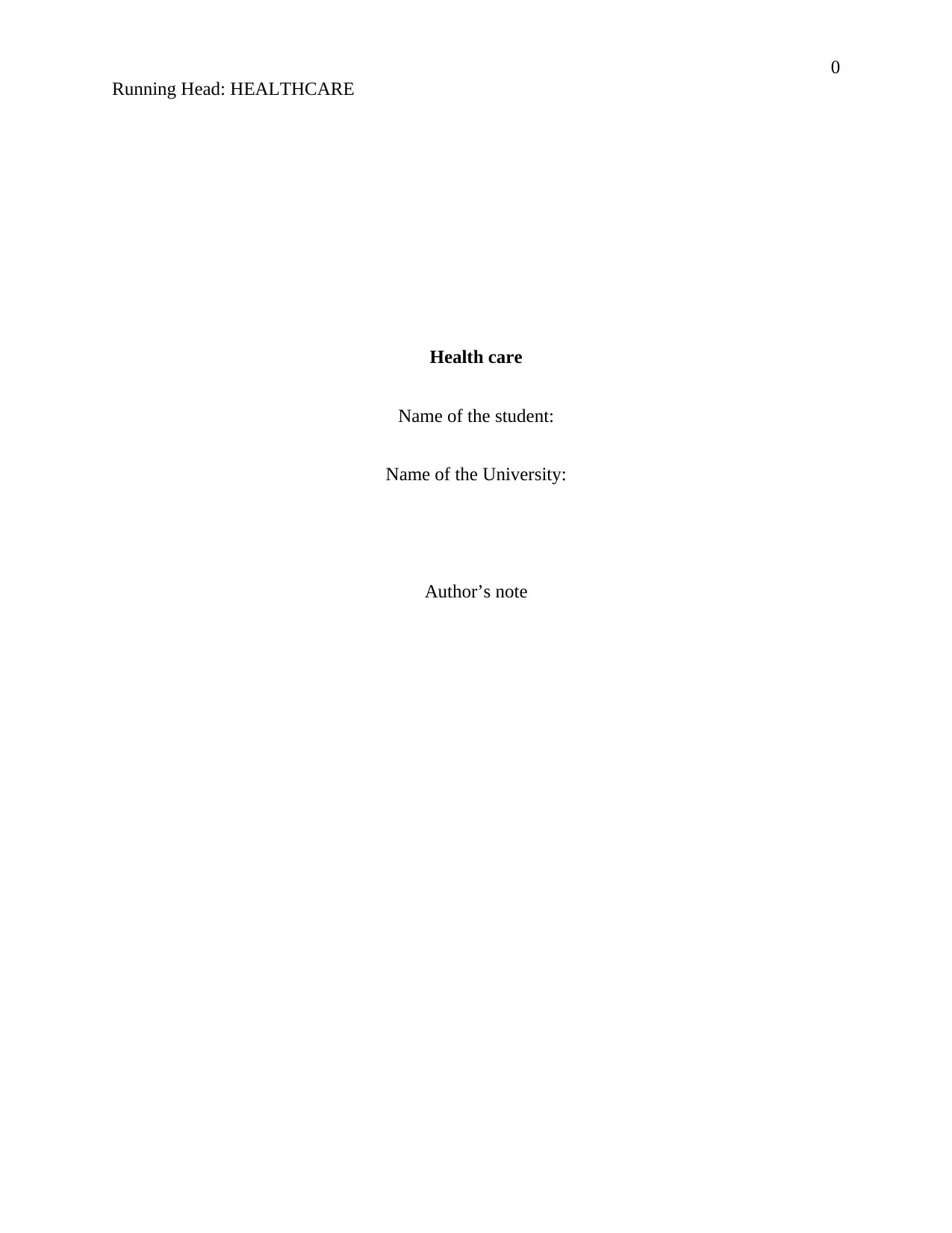
0
Running Head: HEALTHCARE
Health care
Name of the student:
Name of the University:
Author’s note
Running Head: HEALTHCARE
Health care
Name of the student:
Name of the University:
Author’s note
Paraphrase This Document
Need a fresh take? Get an instant paraphrase of this document with our AI Paraphraser
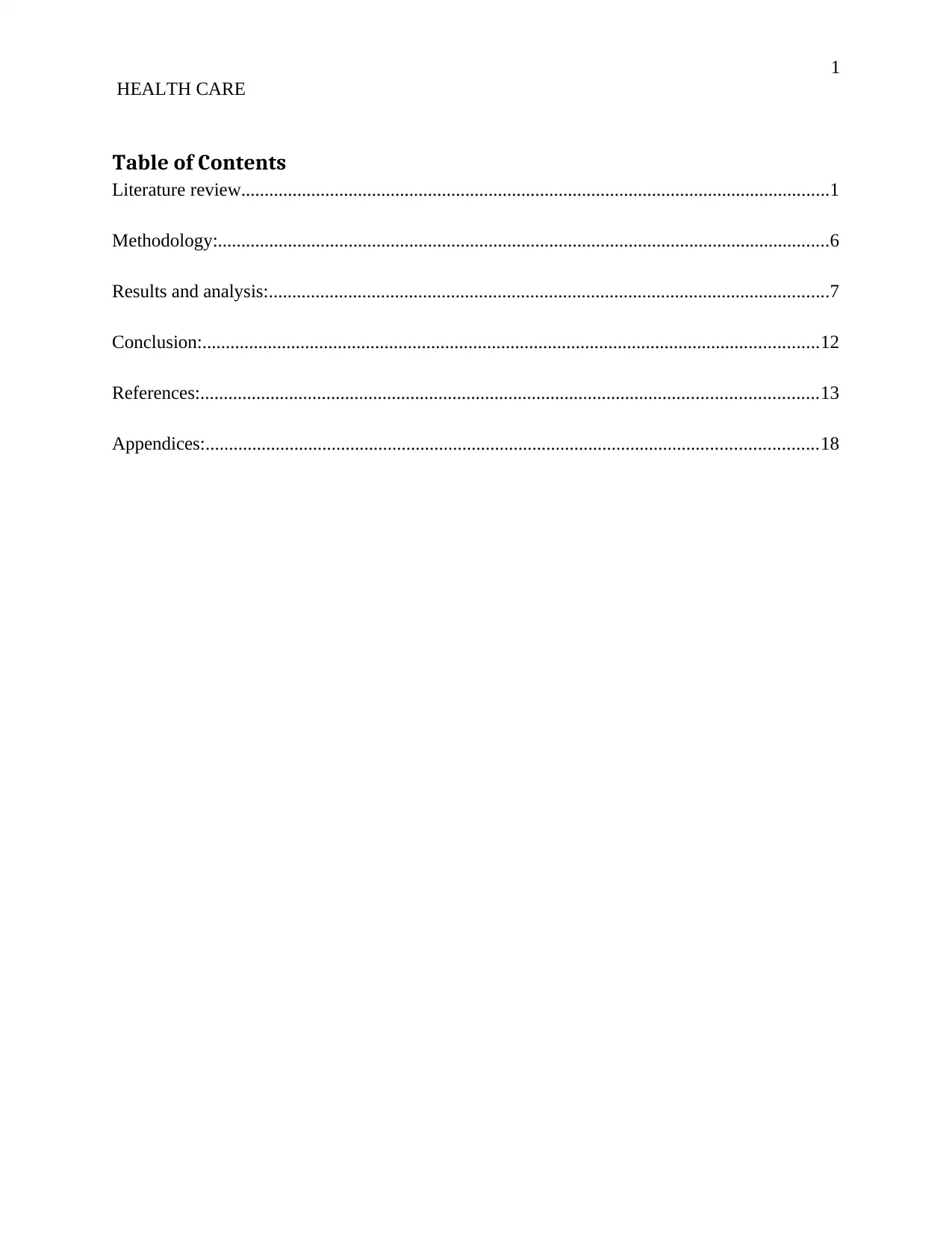
1
HEALTH CARE
Table of Contents
Literature review..............................................................................................................................1
Methodology:...................................................................................................................................6
Results and analysis:........................................................................................................................7
Conclusion:....................................................................................................................................12
References:....................................................................................................................................13
Appendices:...................................................................................................................................18
HEALTH CARE
Table of Contents
Literature review..............................................................................................................................1
Methodology:...................................................................................................................................6
Results and analysis:........................................................................................................................7
Conclusion:....................................................................................................................................12
References:....................................................................................................................................13
Appendices:...................................................................................................................................18
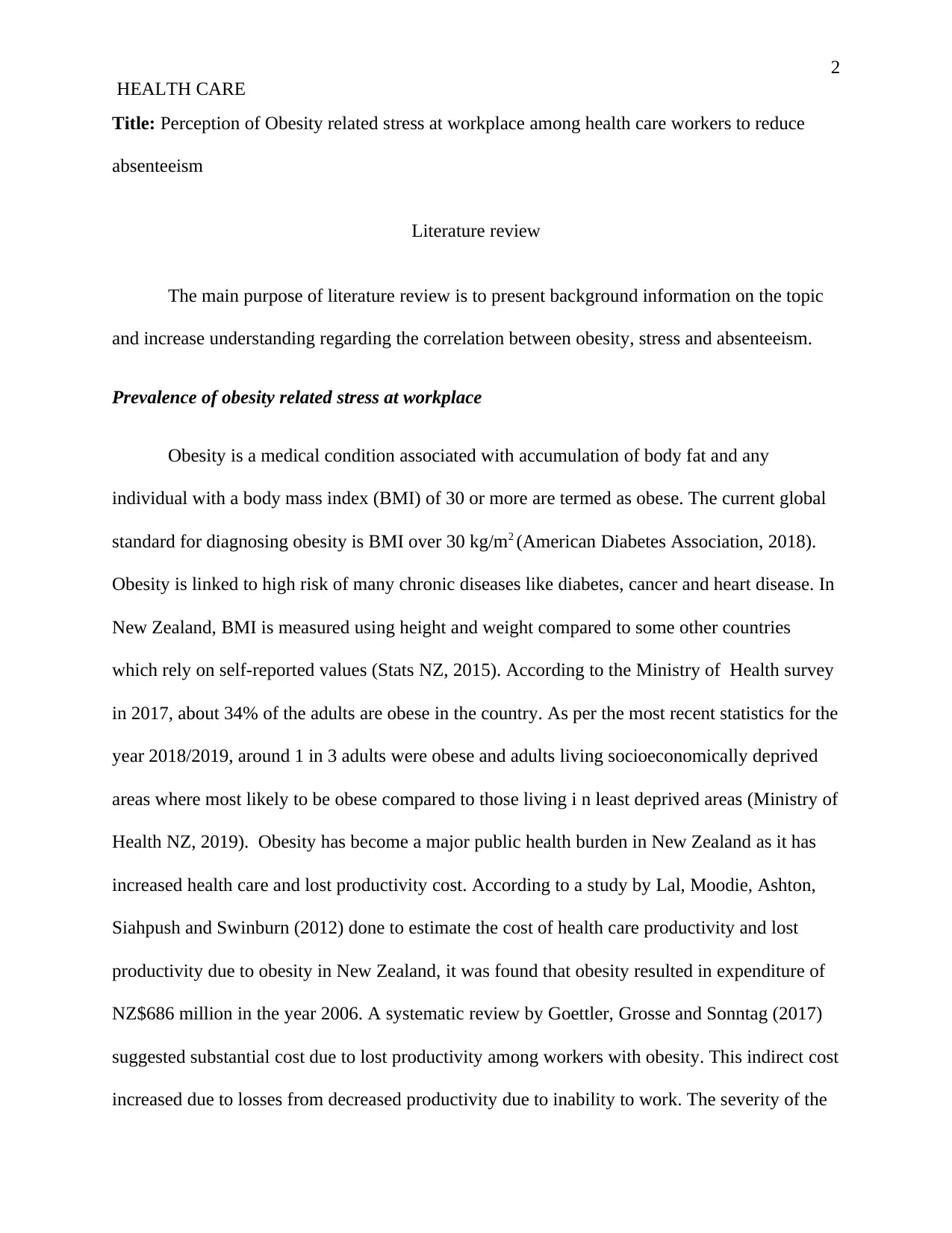
2
HEALTH CARE
Title: Perception of Obesity related stress at workplace among health care workers to reduce
absenteeism
Literature review
The main purpose of literature review is to present background information on the topic
and increase understanding regarding the correlation between obesity, stress and absenteeism.
Prevalence of obesity related stress at workplace
Obesity is a medical condition associated with accumulation of body fat and any
individual with a body mass index (BMI) of 30 or more are termed as obese. The current global
standard for diagnosing obesity is BMI over 30 kg/m2 (American Diabetes Association, 2018).
Obesity is linked to high risk of many chronic diseases like diabetes, cancer and heart disease. In
New Zealand, BMI is measured using height and weight compared to some other countries
which rely on self-reported values (Stats NZ, 2015). According to the Ministry of Health survey
in 2017, about 34% of the adults are obese in the country. As per the most recent statistics for the
year 2018/2019, around 1 in 3 adults were obese and adults living socioeconomically deprived
areas where most likely to be obese compared to those living i n least deprived areas (Ministry of
Health NZ, 2019). Obesity has become a major public health burden in New Zealand as it has
increased health care and lost productivity cost. According to a study by Lal, Moodie, Ashton,
Siahpush and Swinburn (2012) done to estimate the cost of health care productivity and lost
productivity due to obesity in New Zealand, it was found that obesity resulted in expenditure of
NZ$686 million in the year 2006. A systematic review by Goettler, Grosse and Sonntag (2017)
suggested substantial cost due to lost productivity among workers with obesity. This indirect cost
increased due to losses from decreased productivity due to inability to work. The severity of the
HEALTH CARE
Title: Perception of Obesity related stress at workplace among health care workers to reduce
absenteeism
Literature review
The main purpose of literature review is to present background information on the topic
and increase understanding regarding the correlation between obesity, stress and absenteeism.
Prevalence of obesity related stress at workplace
Obesity is a medical condition associated with accumulation of body fat and any
individual with a body mass index (BMI) of 30 or more are termed as obese. The current global
standard for diagnosing obesity is BMI over 30 kg/m2 (American Diabetes Association, 2018).
Obesity is linked to high risk of many chronic diseases like diabetes, cancer and heart disease. In
New Zealand, BMI is measured using height and weight compared to some other countries
which rely on self-reported values (Stats NZ, 2015). According to the Ministry of Health survey
in 2017, about 34% of the adults are obese in the country. As per the most recent statistics for the
year 2018/2019, around 1 in 3 adults were obese and adults living socioeconomically deprived
areas where most likely to be obese compared to those living i n least deprived areas (Ministry of
Health NZ, 2019). Obesity has become a major public health burden in New Zealand as it has
increased health care and lost productivity cost. According to a study by Lal, Moodie, Ashton,
Siahpush and Swinburn (2012) done to estimate the cost of health care productivity and lost
productivity due to obesity in New Zealand, it was found that obesity resulted in expenditure of
NZ$686 million in the year 2006. A systematic review by Goettler, Grosse and Sonntag (2017)
suggested substantial cost due to lost productivity among workers with obesity. This indirect cost
increased due to losses from decreased productivity due to inability to work. The severity of the
⊘ This is a preview!⊘
Do you want full access?
Subscribe today to unlock all pages.

Trusted by 1+ million students worldwide
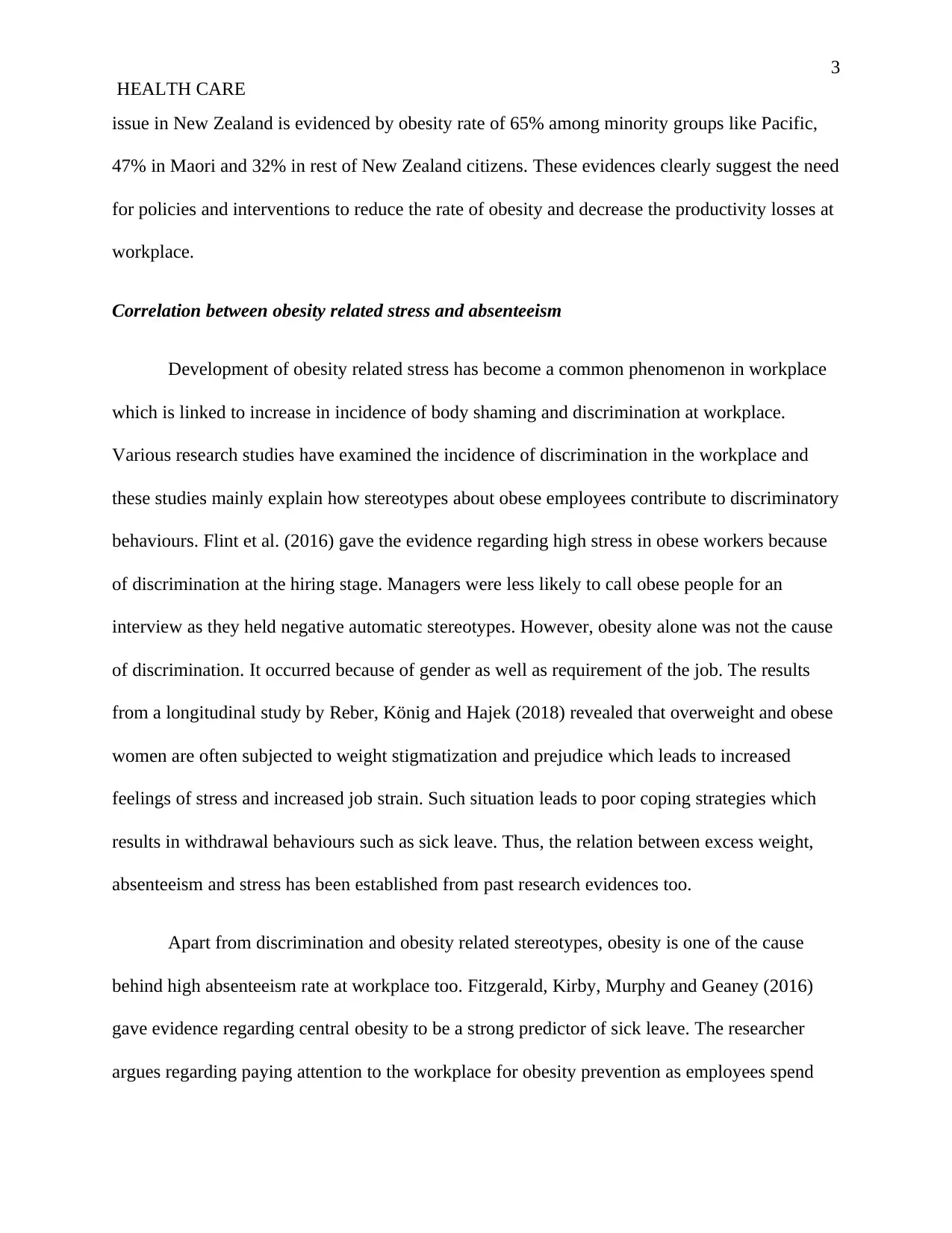
3
HEALTH CARE
issue in New Zealand is evidenced by obesity rate of 65% among minority groups like Pacific,
47% in Maori and 32% in rest of New Zealand citizens. These evidences clearly suggest the need
for policies and interventions to reduce the rate of obesity and decrease the productivity losses at
workplace.
Correlation between obesity related stress and absenteeism
Development of obesity related stress has become a common phenomenon in workplace
which is linked to increase in incidence of body shaming and discrimination at workplace.
Various research studies have examined the incidence of discrimination in the workplace and
these studies mainly explain how stereotypes about obese employees contribute to discriminatory
behaviours. Flint et al. (2016) gave the evidence regarding high stress in obese workers because
of discrimination at the hiring stage. Managers were less likely to call obese people for an
interview as they held negative automatic stereotypes. However, obesity alone was not the cause
of discrimination. It occurred because of gender as well as requirement of the job. The results
from a longitudinal study by Reber, König and Hajek (2018) revealed that overweight and obese
women are often subjected to weight stigmatization and prejudice which leads to increased
feelings of stress and increased job strain. Such situation leads to poor coping strategies which
results in withdrawal behaviours such as sick leave. Thus, the relation between excess weight,
absenteeism and stress has been established from past research evidences too.
Apart from discrimination and obesity related stereotypes, obesity is one of the cause
behind high absenteeism rate at workplace too. Fitzgerald, Kirby, Murphy and Geaney (2016)
gave evidence regarding central obesity to be a strong predictor of sick leave. The researcher
argues regarding paying attention to the workplace for obesity prevention as employees spend
HEALTH CARE
issue in New Zealand is evidenced by obesity rate of 65% among minority groups like Pacific,
47% in Maori and 32% in rest of New Zealand citizens. These evidences clearly suggest the need
for policies and interventions to reduce the rate of obesity and decrease the productivity losses at
workplace.
Correlation between obesity related stress and absenteeism
Development of obesity related stress has become a common phenomenon in workplace
which is linked to increase in incidence of body shaming and discrimination at workplace.
Various research studies have examined the incidence of discrimination in the workplace and
these studies mainly explain how stereotypes about obese employees contribute to discriminatory
behaviours. Flint et al. (2016) gave the evidence regarding high stress in obese workers because
of discrimination at the hiring stage. Managers were less likely to call obese people for an
interview as they held negative automatic stereotypes. However, obesity alone was not the cause
of discrimination. It occurred because of gender as well as requirement of the job. The results
from a longitudinal study by Reber, König and Hajek (2018) revealed that overweight and obese
women are often subjected to weight stigmatization and prejudice which leads to increased
feelings of stress and increased job strain. Such situation leads to poor coping strategies which
results in withdrawal behaviours such as sick leave. Thus, the relation between excess weight,
absenteeism and stress has been established from past research evidences too.
Apart from discrimination and obesity related stereotypes, obesity is one of the cause
behind high absenteeism rate at workplace too. Fitzgerald, Kirby, Murphy and Geaney (2016)
gave evidence regarding central obesity to be a strong predictor of sick leave. The researcher
argues regarding paying attention to the workplace for obesity prevention as employees spend
Paraphrase This Document
Need a fresh take? Get an instant paraphrase of this document with our AI Paraphraser
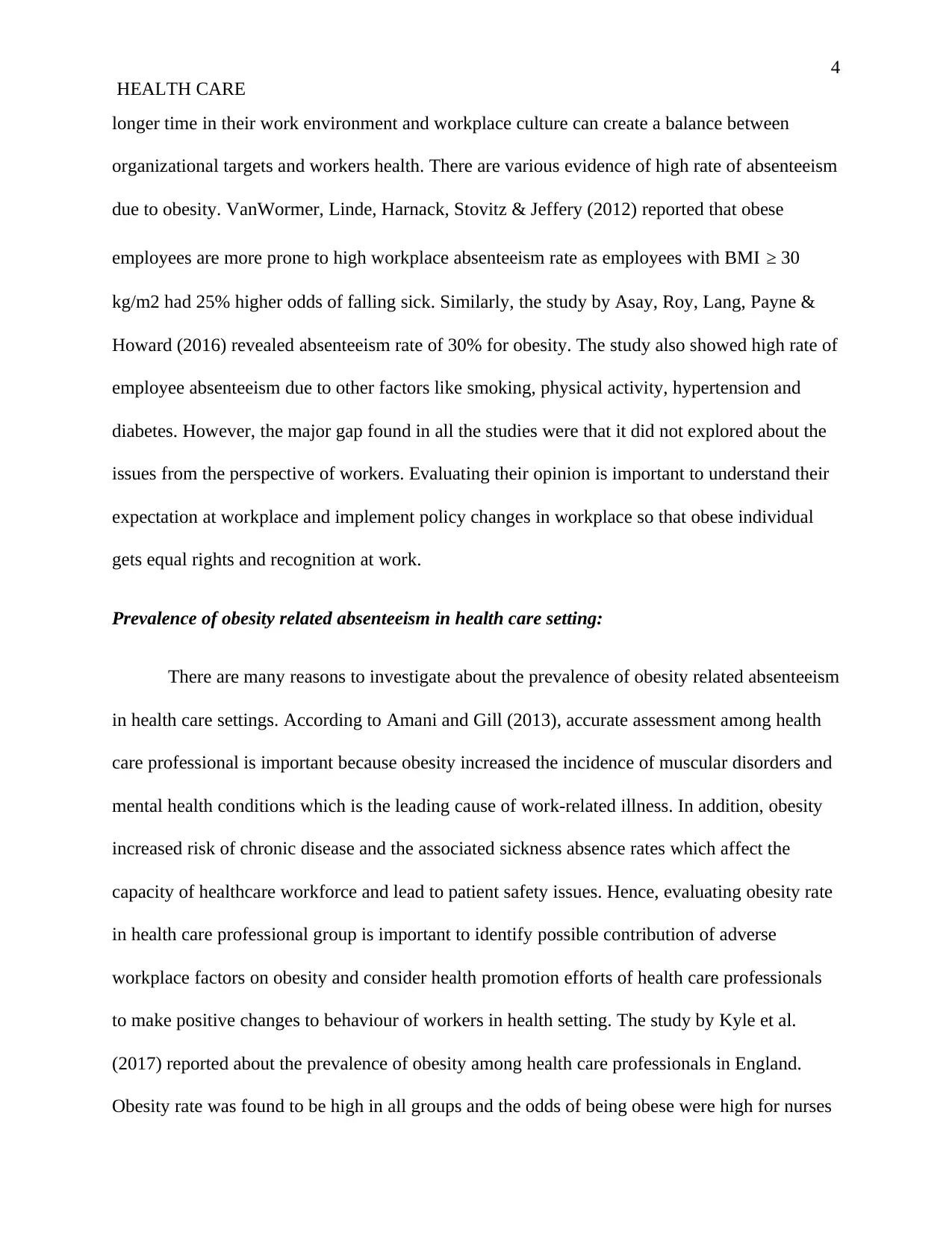
4
HEALTH CARE
longer time in their work environment and workplace culture can create a balance between
organizational targets and workers health. There are various evidence of high rate of absenteeism
due to obesity. VanWormer, Linde, Harnack, Stovitz & Jeffery (2012) reported that obese
employees are more prone to high workplace absenteeism rate as employees with BMI ≥ 30
kg/m2 had 25% higher odds of falling sick. Similarly, the study by Asay, Roy, Lang, Payne &
Howard (2016) revealed absenteeism rate of 30% for obesity. The study also showed high rate of
employee absenteeism due to other factors like smoking, physical activity, hypertension and
diabetes. However, the major gap found in all the studies were that it did not explored about the
issues from the perspective of workers. Evaluating their opinion is important to understand their
expectation at workplace and implement policy changes in workplace so that obese individual
gets equal rights and recognition at work.
Prevalence of obesity related absenteeism in health care setting:
There are many reasons to investigate about the prevalence of obesity related absenteeism
in health care settings. According to Amani and Gill (2013), accurate assessment among health
care professional is important because obesity increased the incidence of muscular disorders and
mental health conditions which is the leading cause of work-related illness. In addition, obesity
increased risk of chronic disease and the associated sickness absence rates which affect the
capacity of healthcare workforce and lead to patient safety issues. Hence, evaluating obesity rate
in health care professional group is important to identify possible contribution of adverse
workplace factors on obesity and consider health promotion efforts of health care professionals
to make positive changes to behaviour of workers in health setting. The study by Kyle et al.
(2017) reported about the prevalence of obesity among health care professionals in England.
Obesity rate was found to be high in all groups and the odds of being obese were high for nurses
HEALTH CARE
longer time in their work environment and workplace culture can create a balance between
organizational targets and workers health. There are various evidence of high rate of absenteeism
due to obesity. VanWormer, Linde, Harnack, Stovitz & Jeffery (2012) reported that obese
employees are more prone to high workplace absenteeism rate as employees with BMI ≥ 30
kg/m2 had 25% higher odds of falling sick. Similarly, the study by Asay, Roy, Lang, Payne &
Howard (2016) revealed absenteeism rate of 30% for obesity. The study also showed high rate of
employee absenteeism due to other factors like smoking, physical activity, hypertension and
diabetes. However, the major gap found in all the studies were that it did not explored about the
issues from the perspective of workers. Evaluating their opinion is important to understand their
expectation at workplace and implement policy changes in workplace so that obese individual
gets equal rights and recognition at work.
Prevalence of obesity related absenteeism in health care setting:
There are many reasons to investigate about the prevalence of obesity related absenteeism
in health care settings. According to Amani and Gill (2013), accurate assessment among health
care professional is important because obesity increased the incidence of muscular disorders and
mental health conditions which is the leading cause of work-related illness. In addition, obesity
increased risk of chronic disease and the associated sickness absence rates which affect the
capacity of healthcare workforce and lead to patient safety issues. Hence, evaluating obesity rate
in health care professional group is important to identify possible contribution of adverse
workplace factors on obesity and consider health promotion efforts of health care professionals
to make positive changes to behaviour of workers in health setting. The study by Kyle et al.
(2017) reported about the prevalence of obesity among health care professionals in England.
Obesity rate was found to be high in all groups and the odds of being obese were high for nurses
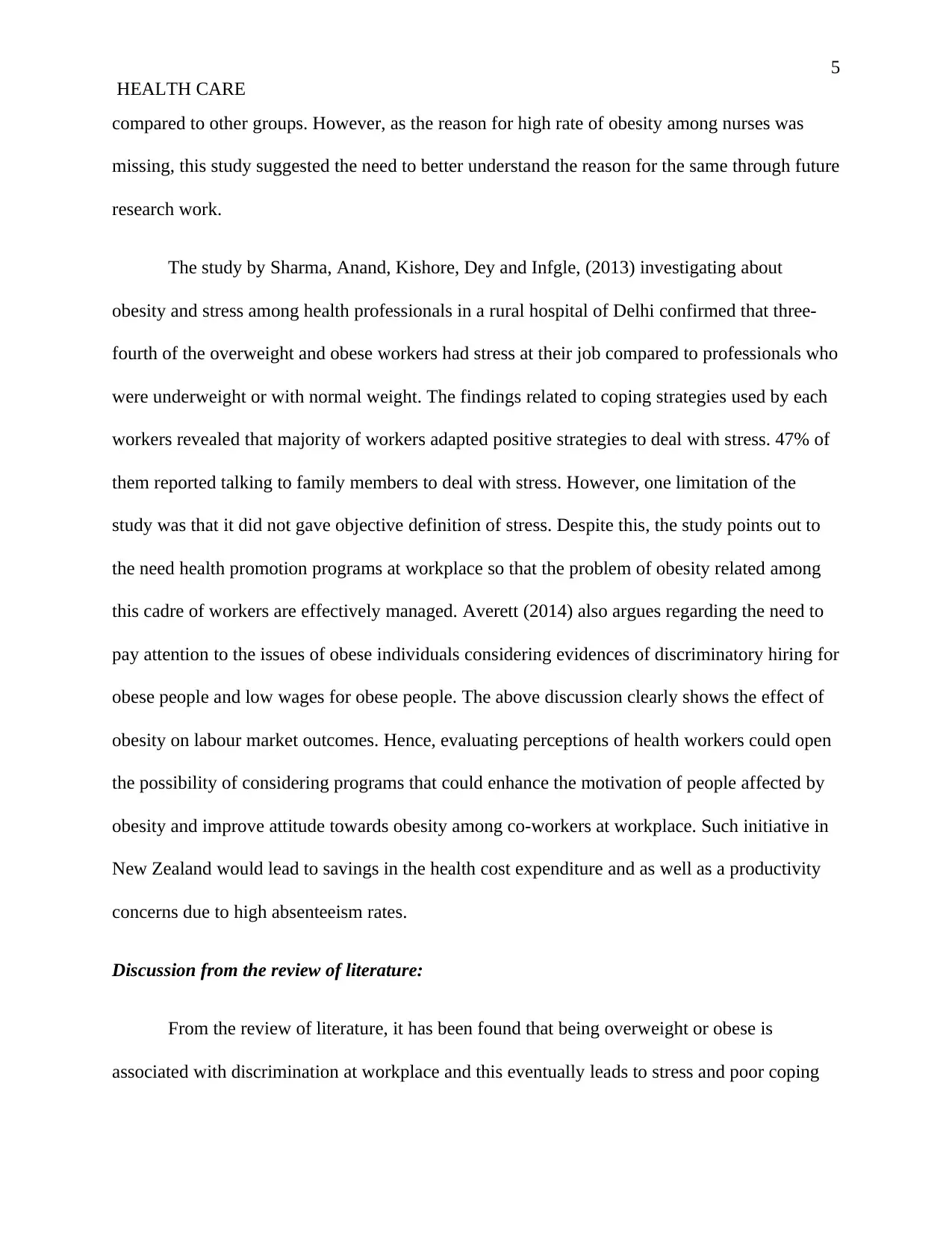
5
HEALTH CARE
compared to other groups. However, as the reason for high rate of obesity among nurses was
missing, this study suggested the need to better understand the reason for the same through future
research work.
The study by Sharma, Anand, Kishore, Dey and Infgle, (2013) investigating about
obesity and stress among health professionals in a rural hospital of Delhi confirmed that three-
fourth of the overweight and obese workers had stress at their job compared to professionals who
were underweight or with normal weight. The findings related to coping strategies used by each
workers revealed that majority of workers adapted positive strategies to deal with stress. 47% of
them reported talking to family members to deal with stress. However, one limitation of the
study was that it did not gave objective definition of stress. Despite this, the study points out to
the need health promotion programs at workplace so that the problem of obesity related among
this cadre of workers are effectively managed. Averett (2014) also argues regarding the need to
pay attention to the issues of obese individuals considering evidences of discriminatory hiring for
obese people and low wages for obese people. The above discussion clearly shows the effect of
obesity on labour market outcomes. Hence, evaluating perceptions of health workers could open
the possibility of considering programs that could enhance the motivation of people affected by
obesity and improve attitude towards obesity among co-workers at workplace. Such initiative in
New Zealand would lead to savings in the health cost expenditure and as well as a productivity
concerns due to high absenteeism rates.
Discussion from the review of literature:
From the review of literature, it has been found that being overweight or obese is
associated with discrimination at workplace and this eventually leads to stress and poor coping
HEALTH CARE
compared to other groups. However, as the reason for high rate of obesity among nurses was
missing, this study suggested the need to better understand the reason for the same through future
research work.
The study by Sharma, Anand, Kishore, Dey and Infgle, (2013) investigating about
obesity and stress among health professionals in a rural hospital of Delhi confirmed that three-
fourth of the overweight and obese workers had stress at their job compared to professionals who
were underweight or with normal weight. The findings related to coping strategies used by each
workers revealed that majority of workers adapted positive strategies to deal with stress. 47% of
them reported talking to family members to deal with stress. However, one limitation of the
study was that it did not gave objective definition of stress. Despite this, the study points out to
the need health promotion programs at workplace so that the problem of obesity related among
this cadre of workers are effectively managed. Averett (2014) also argues regarding the need to
pay attention to the issues of obese individuals considering evidences of discriminatory hiring for
obese people and low wages for obese people. The above discussion clearly shows the effect of
obesity on labour market outcomes. Hence, evaluating perceptions of health workers could open
the possibility of considering programs that could enhance the motivation of people affected by
obesity and improve attitude towards obesity among co-workers at workplace. Such initiative in
New Zealand would lead to savings in the health cost expenditure and as well as a productivity
concerns due to high absenteeism rates.
Discussion from the review of literature:
From the review of literature, it has been found that being overweight or obese is
associated with discrimination at workplace and this eventually leads to stress and poor coping
⊘ This is a preview!⊘
Do you want full access?
Subscribe today to unlock all pages.

Trusted by 1+ million students worldwide
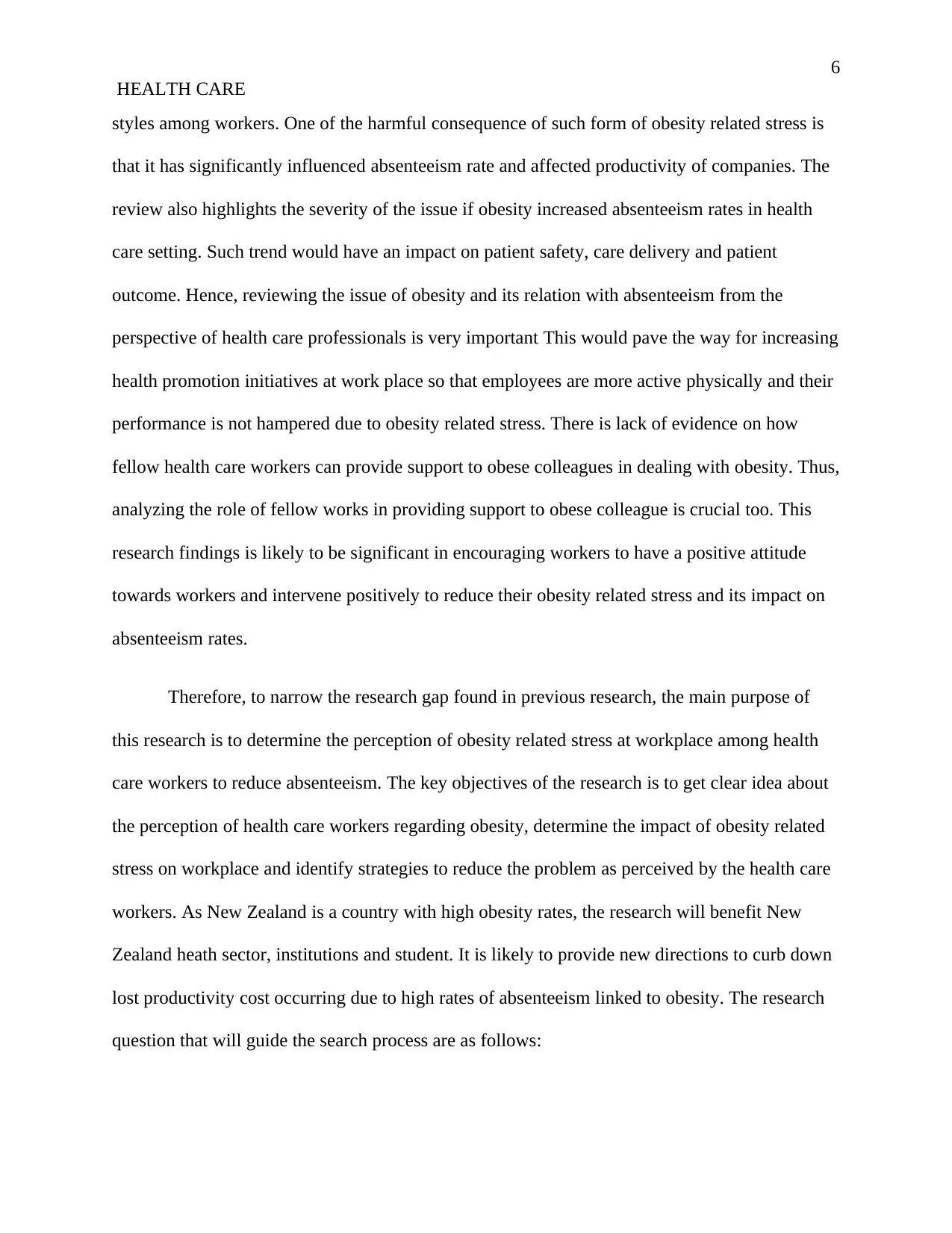
6
HEALTH CARE
styles among workers. One of the harmful consequence of such form of obesity related stress is
that it has significantly influenced absenteeism rate and affected productivity of companies. The
review also highlights the severity of the issue if obesity increased absenteeism rates in health
care setting. Such trend would have an impact on patient safety, care delivery and patient
outcome. Hence, reviewing the issue of obesity and its relation with absenteeism from the
perspective of health care professionals is very important This would pave the way for increasing
health promotion initiatives at work place so that employees are more active physically and their
performance is not hampered due to obesity related stress. There is lack of evidence on how
fellow health care workers can provide support to obese colleagues in dealing with obesity. Thus,
analyzing the role of fellow works in providing support to obese colleague is crucial too. This
research findings is likely to be significant in encouraging workers to have a positive attitude
towards workers and intervene positively to reduce their obesity related stress and its impact on
absenteeism rates.
Therefore, to narrow the research gap found in previous research, the main purpose of
this research is to determine the perception of obesity related stress at workplace among health
care workers to reduce absenteeism. The key objectives of the research is to get clear idea about
the perception of health care workers regarding obesity, determine the impact of obesity related
stress on workplace and identify strategies to reduce the problem as perceived by the health care
workers. As New Zealand is a country with high obesity rates, the research will benefit New
Zealand heath sector, institutions and student. It is likely to provide new directions to curb down
lost productivity cost occurring due to high rates of absenteeism linked to obesity. The research
question that will guide the search process are as follows:
HEALTH CARE
styles among workers. One of the harmful consequence of such form of obesity related stress is
that it has significantly influenced absenteeism rate and affected productivity of companies. The
review also highlights the severity of the issue if obesity increased absenteeism rates in health
care setting. Such trend would have an impact on patient safety, care delivery and patient
outcome. Hence, reviewing the issue of obesity and its relation with absenteeism from the
perspective of health care professionals is very important This would pave the way for increasing
health promotion initiatives at work place so that employees are more active physically and their
performance is not hampered due to obesity related stress. There is lack of evidence on how
fellow health care workers can provide support to obese colleagues in dealing with obesity. Thus,
analyzing the role of fellow works in providing support to obese colleague is crucial too. This
research findings is likely to be significant in encouraging workers to have a positive attitude
towards workers and intervene positively to reduce their obesity related stress and its impact on
absenteeism rates.
Therefore, to narrow the research gap found in previous research, the main purpose of
this research is to determine the perception of obesity related stress at workplace among health
care workers to reduce absenteeism. The key objectives of the research is to get clear idea about
the perception of health care workers regarding obesity, determine the impact of obesity related
stress on workplace and identify strategies to reduce the problem as perceived by the health care
workers. As New Zealand is a country with high obesity rates, the research will benefit New
Zealand heath sector, institutions and student. It is likely to provide new directions to curb down
lost productivity cost occurring due to high rates of absenteeism linked to obesity. The research
question that will guide the search process are as follows:
Paraphrase This Document
Need a fresh take? Get an instant paraphrase of this document with our AI Paraphraser
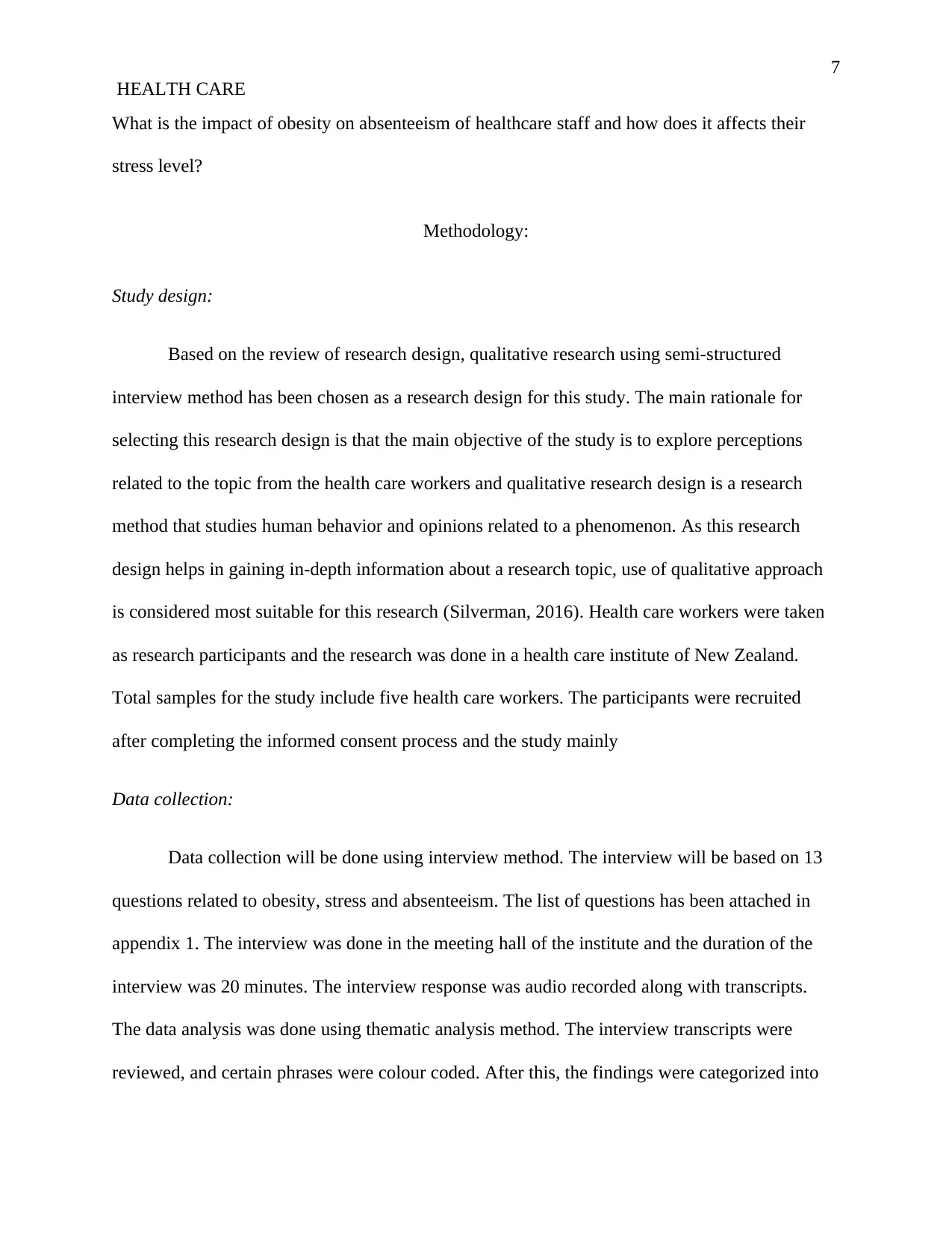
7
HEALTH CARE
What is the impact of obesity on absenteeism of healthcare staff and how does it affects their
stress level?
Methodology:
Study design:
Based on the review of research design, qualitative research using semi-structured
interview method has been chosen as a research design for this study. The main rationale for
selecting this research design is that the main objective of the study is to explore perceptions
related to the topic from the health care workers and qualitative research design is a research
method that studies human behavior and opinions related to a phenomenon. As this research
design helps in gaining in-depth information about a research topic, use of qualitative approach
is considered most suitable for this research (Silverman, 2016). Health care workers were taken
as research participants and the research was done in a health care institute of New Zealand.
Total samples for the study include five health care workers. The participants were recruited
after completing the informed consent process and the study mainly
Data collection:
Data collection will be done using interview method. The interview will be based on 13
questions related to obesity, stress and absenteeism. The list of questions has been attached in
appendix 1. The interview was done in the meeting hall of the institute and the duration of the
interview was 20 minutes. The interview response was audio recorded along with transcripts.
The data analysis was done using thematic analysis method. The interview transcripts were
reviewed, and certain phrases were colour coded. After this, the findings were categorized into
HEALTH CARE
What is the impact of obesity on absenteeism of healthcare staff and how does it affects their
stress level?
Methodology:
Study design:
Based on the review of research design, qualitative research using semi-structured
interview method has been chosen as a research design for this study. The main rationale for
selecting this research design is that the main objective of the study is to explore perceptions
related to the topic from the health care workers and qualitative research design is a research
method that studies human behavior and opinions related to a phenomenon. As this research
design helps in gaining in-depth information about a research topic, use of qualitative approach
is considered most suitable for this research (Silverman, 2016). Health care workers were taken
as research participants and the research was done in a health care institute of New Zealand.
Total samples for the study include five health care workers. The participants were recruited
after completing the informed consent process and the study mainly
Data collection:
Data collection will be done using interview method. The interview will be based on 13
questions related to obesity, stress and absenteeism. The list of questions has been attached in
appendix 1. The interview was done in the meeting hall of the institute and the duration of the
interview was 20 minutes. The interview response was audio recorded along with transcripts.
The data analysis was done using thematic analysis method. The interview transcripts were
reviewed, and certain phrases were colour coded. After this, the findings were categorized into
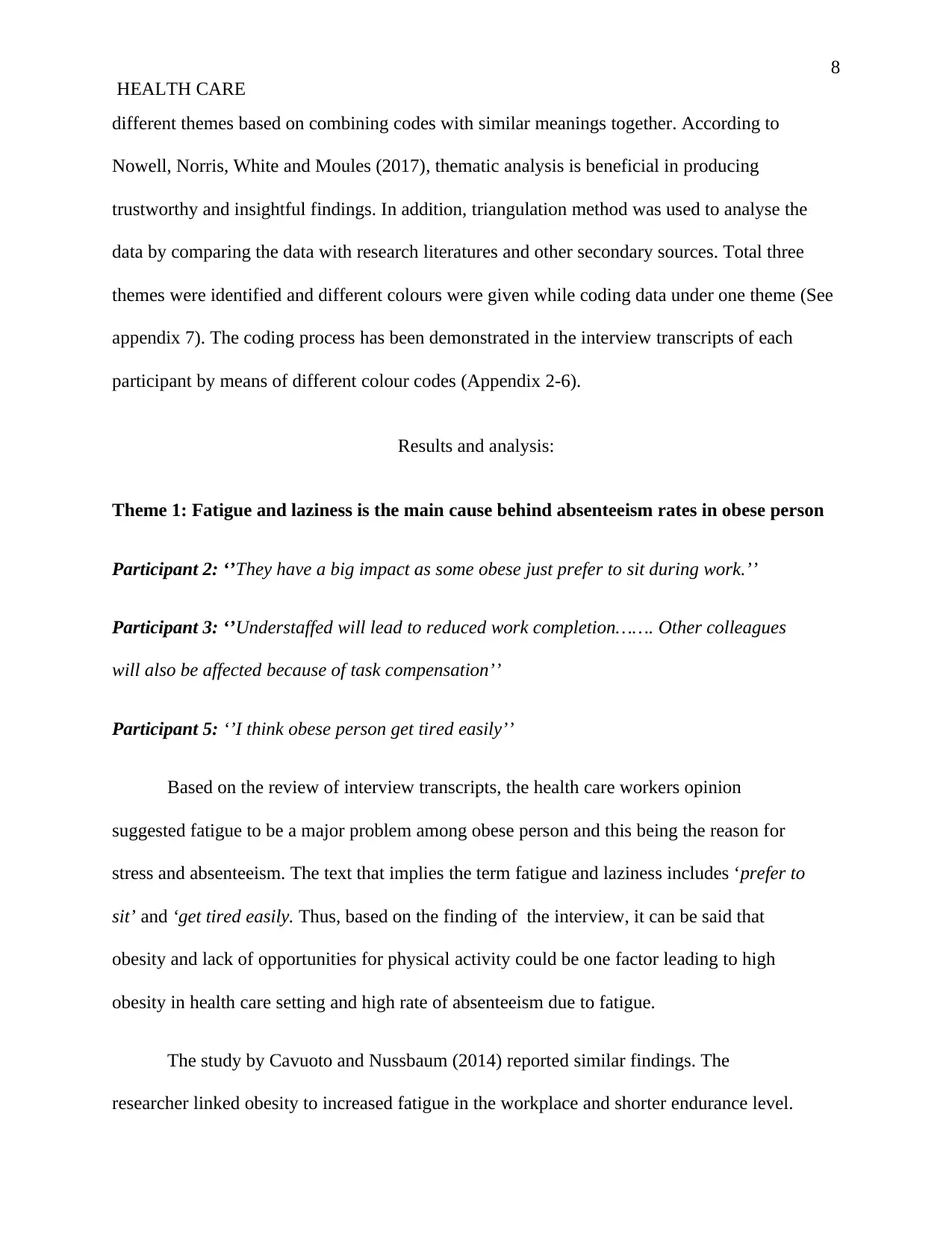
8
HEALTH CARE
different themes based on combining codes with similar meanings together. According to
Nowell, Norris, White and Moules (2017), thematic analysis is beneficial in producing
trustworthy and insightful findings. In addition, triangulation method was used to analyse the
data by comparing the data with research literatures and other secondary sources. Total three
themes were identified and different colours were given while coding data under one theme (See
appendix 7). The coding process has been demonstrated in the interview transcripts of each
participant by means of different colour codes (Appendix 2-6).
Results and analysis:
Theme 1: Fatigue and laziness is the main cause behind absenteeism rates in obese person
Participant 2: ‘’They have a big impact as some obese just prefer to sit during work.’’
Participant 3: ‘’Understaffed will lead to reduced work completion……. Other colleagues
will also be affected because of task compensation’’
Participant 5: ‘’I think obese person get tired easily’’
Based on the review of interview transcripts, the health care workers opinion
suggested fatigue to be a major problem among obese person and this being the reason for
stress and absenteeism. The text that implies the term fatigue and laziness includes ‘prefer to
sit’ and ‘get tired easily. Thus, based on the finding of the interview, it can be said that
obesity and lack of opportunities for physical activity could be one factor leading to high
obesity in health care setting and high rate of absenteeism due to fatigue.
The study by Cavuoto and Nussbaum (2014) reported similar findings. The
researcher linked obesity to increased fatigue in the workplace and shorter endurance level.
HEALTH CARE
different themes based on combining codes with similar meanings together. According to
Nowell, Norris, White and Moules (2017), thematic analysis is beneficial in producing
trustworthy and insightful findings. In addition, triangulation method was used to analyse the
data by comparing the data with research literatures and other secondary sources. Total three
themes were identified and different colours were given while coding data under one theme (See
appendix 7). The coding process has been demonstrated in the interview transcripts of each
participant by means of different colour codes (Appendix 2-6).
Results and analysis:
Theme 1: Fatigue and laziness is the main cause behind absenteeism rates in obese person
Participant 2: ‘’They have a big impact as some obese just prefer to sit during work.’’
Participant 3: ‘’Understaffed will lead to reduced work completion……. Other colleagues
will also be affected because of task compensation’’
Participant 5: ‘’I think obese person get tired easily’’
Based on the review of interview transcripts, the health care workers opinion
suggested fatigue to be a major problem among obese person and this being the reason for
stress and absenteeism. The text that implies the term fatigue and laziness includes ‘prefer to
sit’ and ‘get tired easily. Thus, based on the finding of the interview, it can be said that
obesity and lack of opportunities for physical activity could be one factor leading to high
obesity in health care setting and high rate of absenteeism due to fatigue.
The study by Cavuoto and Nussbaum (2014) reported similar findings. The
researcher linked obesity to increased fatigue in the workplace and shorter endurance level.
⊘ This is a preview!⊘
Do you want full access?
Subscribe today to unlock all pages.

Trusted by 1+ million students worldwide
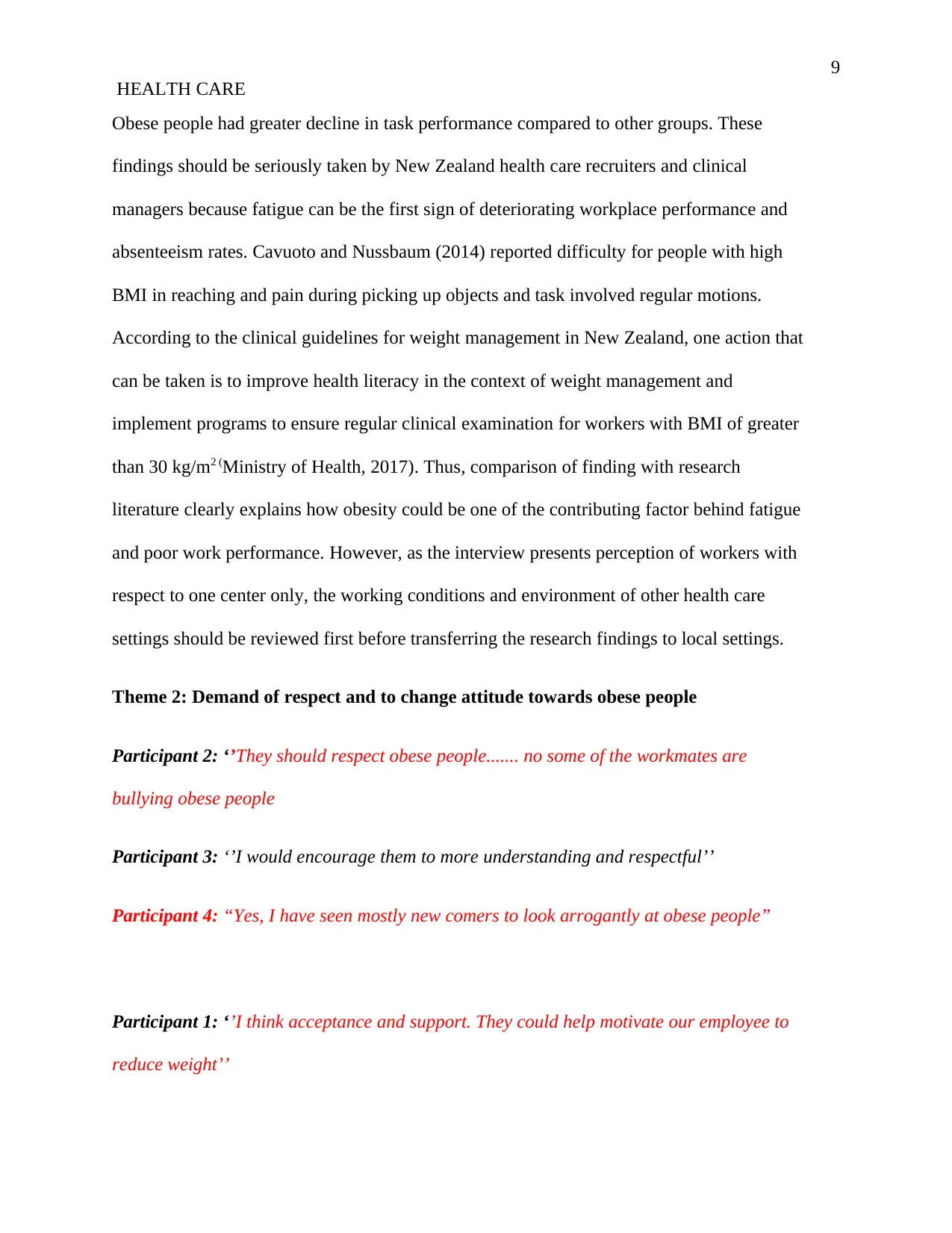
9
HEALTH CARE
Obese people had greater decline in task performance compared to other groups. These
findings should be seriously taken by New Zealand health care recruiters and clinical
managers because fatigue can be the first sign of deteriorating workplace performance and
absenteeism rates. Cavuoto and Nussbaum (2014) reported difficulty for people with high
BMI in reaching and pain during picking up objects and task involved regular motions.
According to the clinical guidelines for weight management in New Zealand, one action that
can be taken is to improve health literacy in the context of weight management and
implement programs to ensure regular clinical examination for workers with BMI of greater
than 30 kg/m2 (Ministry of Health, 2017). Thus, comparison of finding with research
literature clearly explains how obesity could be one of the contributing factor behind fatigue
and poor work performance. However, as the interview presents perception of workers with
respect to one center only, the working conditions and environment of other health care
settings should be reviewed first before transferring the research findings to local settings.
Theme 2: Demand of respect and to change attitude towards obese people
Participant 2: ‘’They should respect obese people....... no some of the workmates are
bullying obese people
Participant 3: ‘’I would encourage them to more understanding and respectful’’
Participant 4: “Yes, I have seen mostly new comers to look arrogantly at obese people”
Participant 1: ‘’I think acceptance and support. They could help motivate our employee to
reduce weight’’
HEALTH CARE
Obese people had greater decline in task performance compared to other groups. These
findings should be seriously taken by New Zealand health care recruiters and clinical
managers because fatigue can be the first sign of deteriorating workplace performance and
absenteeism rates. Cavuoto and Nussbaum (2014) reported difficulty for people with high
BMI in reaching and pain during picking up objects and task involved regular motions.
According to the clinical guidelines for weight management in New Zealand, one action that
can be taken is to improve health literacy in the context of weight management and
implement programs to ensure regular clinical examination for workers with BMI of greater
than 30 kg/m2 (Ministry of Health, 2017). Thus, comparison of finding with research
literature clearly explains how obesity could be one of the contributing factor behind fatigue
and poor work performance. However, as the interview presents perception of workers with
respect to one center only, the working conditions and environment of other health care
settings should be reviewed first before transferring the research findings to local settings.
Theme 2: Demand of respect and to change attitude towards obese people
Participant 2: ‘’They should respect obese people....... no some of the workmates are
bullying obese people
Participant 3: ‘’I would encourage them to more understanding and respectful’’
Participant 4: “Yes, I have seen mostly new comers to look arrogantly at obese people”
Participant 1: ‘’I think acceptance and support. They could help motivate our employee to
reduce weight’’
Paraphrase This Document
Need a fresh take? Get an instant paraphrase of this document with our AI Paraphraser
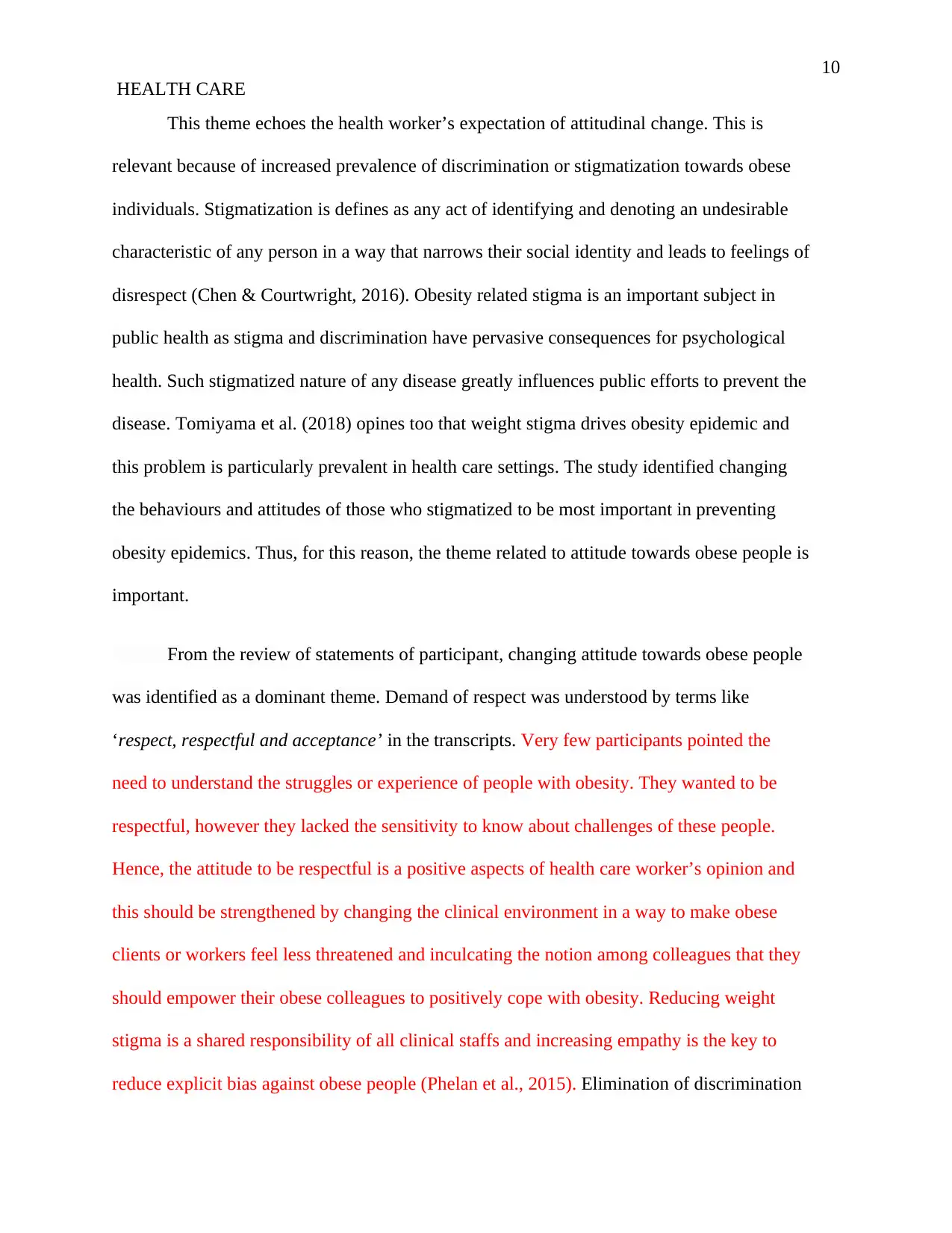
10
HEALTH CARE
This theme echoes the health worker’s expectation of attitudinal change. This is
relevant because of increased prevalence of discrimination or stigmatization towards obese
individuals. Stigmatization is defines as any act of identifying and denoting an undesirable
characteristic of any person in a way that narrows their social identity and leads to feelings of
disrespect (Chen & Courtwright, 2016). Obesity related stigma is an important subject in
public health as stigma and discrimination have pervasive consequences for psychological
health. Such stigmatized nature of any disease greatly influences public efforts to prevent the
disease. Tomiyama et al. (2018) opines too that weight stigma drives obesity epidemic and
this problem is particularly prevalent in health care settings. The study identified changing
the behaviours and attitudes of those who stigmatized to be most important in preventing
obesity epidemics. Thus, for this reason, the theme related to attitude towards obese people is
important.
From the review of statements of participant, changing attitude towards obese people
was identified as a dominant theme. Demand of respect was understood by terms like
‘respect, respectful and acceptance’ in the transcripts. Very few participants pointed the
need to understand the struggles or experience of people with obesity. They wanted to be
respectful, however they lacked the sensitivity to know about challenges of these people.
Hence, the attitude to be respectful is a positive aspects of health care worker’s opinion and
this should be strengthened by changing the clinical environment in a way to make obese
clients or workers feel less threatened and inculcating the notion among colleagues that they
should empower their obese colleagues to positively cope with obesity. Reducing weight
stigma is a shared responsibility of all clinical staffs and increasing empathy is the key to
reduce explicit bias against obese people (Phelan et al., 2015). Elimination of discrimination
HEALTH CARE
This theme echoes the health worker’s expectation of attitudinal change. This is
relevant because of increased prevalence of discrimination or stigmatization towards obese
individuals. Stigmatization is defines as any act of identifying and denoting an undesirable
characteristic of any person in a way that narrows their social identity and leads to feelings of
disrespect (Chen & Courtwright, 2016). Obesity related stigma is an important subject in
public health as stigma and discrimination have pervasive consequences for psychological
health. Such stigmatized nature of any disease greatly influences public efforts to prevent the
disease. Tomiyama et al. (2018) opines too that weight stigma drives obesity epidemic and
this problem is particularly prevalent in health care settings. The study identified changing
the behaviours and attitudes of those who stigmatized to be most important in preventing
obesity epidemics. Thus, for this reason, the theme related to attitude towards obese people is
important.
From the review of statements of participant, changing attitude towards obese people
was identified as a dominant theme. Demand of respect was understood by terms like
‘respect, respectful and acceptance’ in the transcripts. Very few participants pointed the
need to understand the struggles or experience of people with obesity. They wanted to be
respectful, however they lacked the sensitivity to know about challenges of these people.
Hence, the attitude to be respectful is a positive aspects of health care worker’s opinion and
this should be strengthened by changing the clinical environment in a way to make obese
clients or workers feel less threatened and inculcating the notion among colleagues that they
should empower their obese colleagues to positively cope with obesity. Reducing weight
stigma is a shared responsibility of all clinical staffs and increasing empathy is the key to
reduce explicit bias against obese people (Phelan et al., 2015). Elimination of discrimination
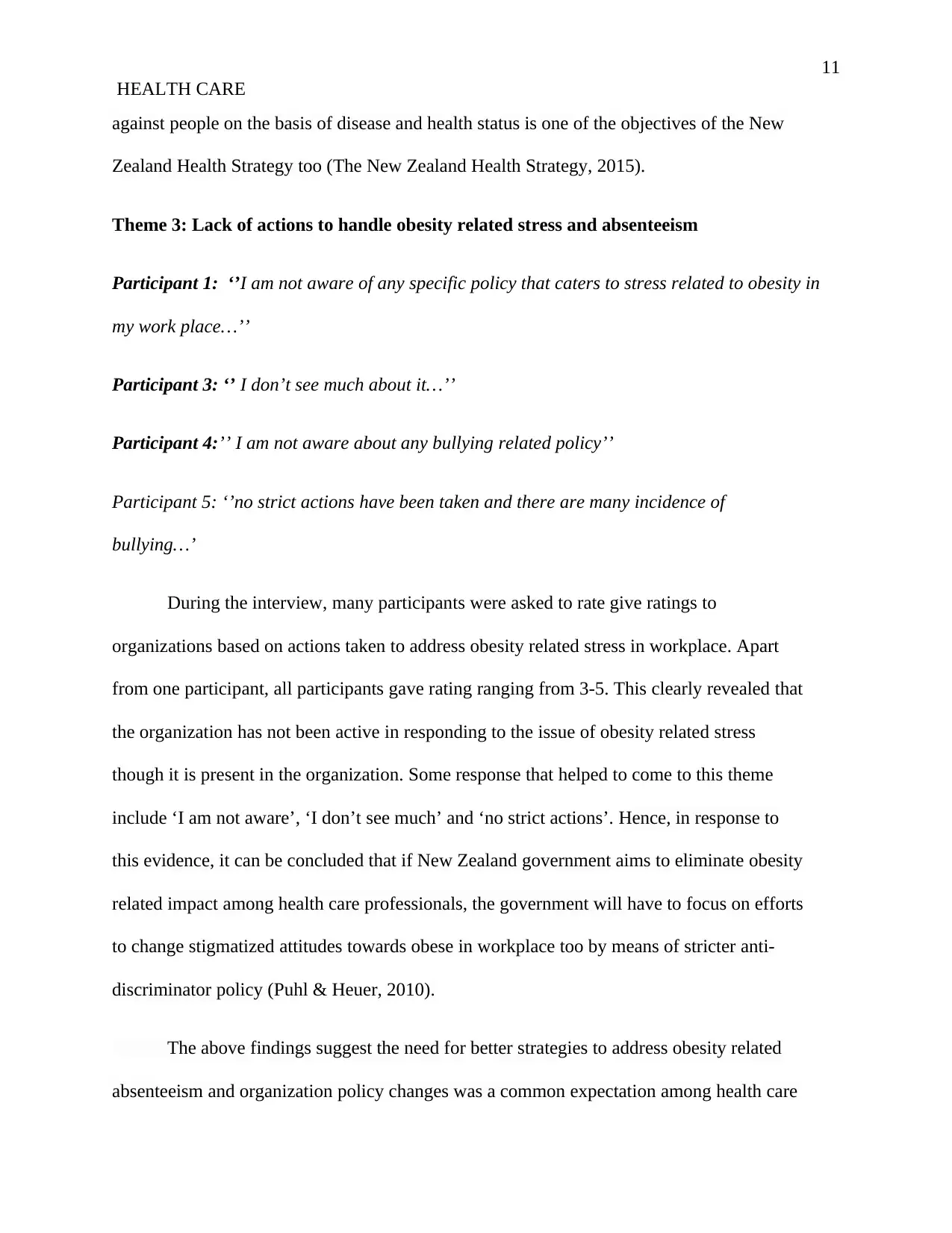
11
HEALTH CARE
against people on the basis of disease and health status is one of the objectives of the New
Zealand Health Strategy too (The New Zealand Health Strategy, 2015).
Theme 3: Lack of actions to handle obesity related stress and absenteeism
Participant 1: ‘’I am not aware of any specific policy that caters to stress related to obesity in
my work place…’’
Participant 3: ‘’ I don’t see much about it…’’
Participant 4:’’ I am not aware about any bullying related policy’’
Participant 5: ‘’no strict actions have been taken and there are many incidence of
bullying…’
During the interview, many participants were asked to rate give ratings to
organizations based on actions taken to address obesity related stress in workplace. Apart
from one participant, all participants gave rating ranging from 3-5. This clearly revealed that
the organization has not been active in responding to the issue of obesity related stress
though it is present in the organization. Some response that helped to come to this theme
include ‘I am not aware’, ‘I don’t see much’ and ‘no strict actions’. Hence, in response to
this evidence, it can be concluded that if New Zealand government aims to eliminate obesity
related impact among health care professionals, the government will have to focus on efforts
to change stigmatized attitudes towards obese in workplace too by means of stricter anti-
discriminator policy (Puhl & Heuer, 2010).
The above findings suggest the need for better strategies to address obesity related
absenteeism and organization policy changes was a common expectation among health care
HEALTH CARE
against people on the basis of disease and health status is one of the objectives of the New
Zealand Health Strategy too (The New Zealand Health Strategy, 2015).
Theme 3: Lack of actions to handle obesity related stress and absenteeism
Participant 1: ‘’I am not aware of any specific policy that caters to stress related to obesity in
my work place…’’
Participant 3: ‘’ I don’t see much about it…’’
Participant 4:’’ I am not aware about any bullying related policy’’
Participant 5: ‘’no strict actions have been taken and there are many incidence of
bullying…’
During the interview, many participants were asked to rate give ratings to
organizations based on actions taken to address obesity related stress in workplace. Apart
from one participant, all participants gave rating ranging from 3-5. This clearly revealed that
the organization has not been active in responding to the issue of obesity related stress
though it is present in the organization. Some response that helped to come to this theme
include ‘I am not aware’, ‘I don’t see much’ and ‘no strict actions’. Hence, in response to
this evidence, it can be concluded that if New Zealand government aims to eliminate obesity
related impact among health care professionals, the government will have to focus on efforts
to change stigmatized attitudes towards obese in workplace too by means of stricter anti-
discriminator policy (Puhl & Heuer, 2010).
The above findings suggest the need for better strategies to address obesity related
absenteeism and organization policy changes was a common expectation among health care
⊘ This is a preview!⊘
Do you want full access?
Subscribe today to unlock all pages.

Trusted by 1+ million students worldwide
1 out of 29
Related Documents
Your All-in-One AI-Powered Toolkit for Academic Success.
+13062052269
info@desklib.com
Available 24*7 on WhatsApp / Email
![[object Object]](/_next/static/media/star-bottom.7253800d.svg)
Unlock your academic potential
Copyright © 2020–2025 A2Z Services. All Rights Reserved. Developed and managed by ZUCOL.



